In international relations, intergovernmentalism treats states as the primary actors in the integration process. Intergovernmentalist approaches claim to be able to explain both periods of radical change in the European Union because of converging governmental preferences and periods of inertia because of diverging national interests.

The United Nations Economic and Social Council (ECOSOC) is one of the six principal organs of the United Nations, responsible for coordinating the economic and social fields of the organization, specifically in regards to the fifteen specialized agencies, the eight functional commissions, and the five regional commissions under its jurisdiction.

The University for Peace (UPEACE) is an international university and intergovernmental organization established as a treaty organisation by the United Nations General Assembly in 1980. The university offers postgraduate, doctoral, and executive programmes related to the study of peace and conflict, environment and development, and international law.
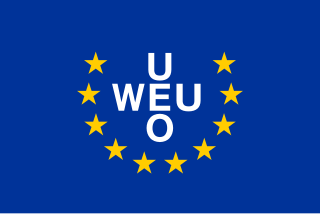
The Western European Union was the international organisation and military alliance that succeeded the Western Union (WU) after the 1954 amendment of the 1948 Treaty of Brussels. The WEU implemented the Modified Brussels Treaty. During the Cold War, the Western Bloc included the WEU member-states, plus the United States and Canada, as part of the North Atlantic Treaty Organization (NATO).

The European Organization for Nuclear Research, known as CERN, is an intergovernmental organization that operates the largest particle physics laboratory in the world. Established in 1954, it is based in Meyrin, western suburb of Geneva, on the France–Switzerland border. It comprises 23 member states. Israel, admitted in 2013, is the only non-European full member. CERN is an official United Nations General Assembly observer.

DESY, short for Deutsches Elektronen-Synchrotron, is a national research centre for fundamental science located in Hamburg and Zeuthen near Berlin in Germany. It operates particle accelerators used to investigate the structure, dynamics and function of matter, and conducts a broad spectrum of interdisciplinary scientific research in four main areas: particle and high energy physics; photon science; astroparticle physics; and the development, construction and operation of particle accelerators. Its name refers to its first project, an electron synchrotron. DESY is publicly financed by the Federal Republic of Germany and the Federal States of Hamburg and Brandenburg and is a member of the Helmholtz Association.
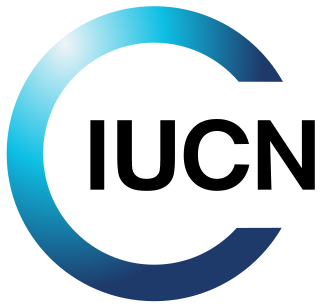
The International Union for Conservation of Nature (IUCN) is an international organization working in the field of nature conservation and sustainable use of natural resources. Founded in 1948, IUCN has become the global authority on the status of the natural world and the measures needed to safeguard it. It is involved in data gathering and analysis, research, field projects, advocacy, and education. IUCN's mission is to "influence, encourage and assist societies throughout the world to conserve nature and to ensure that any use of natural resources is equitable and ecologically sustainable".
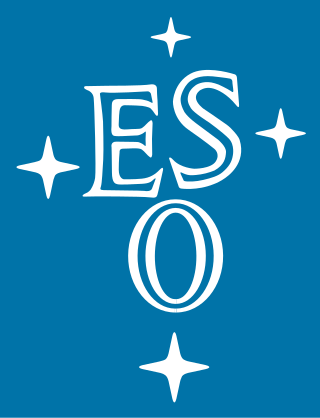
The European Organisation for Astronomical Research in the Southern Hemisphere, commonly referred to as the European Southern Observatory (ESO), is an intergovernmental research organisation made up of 16 member states for ground-based astronomy. Created in 1962, ESO has provided astronomers with state-of-the-art research facilities and access to the southern sky. The organisation employs over 750 staff members and receives annual member state contributions of approximately €162 million. Its observatories are located in northern Chile.

The Economic Cooperation Organization or ECO is a Eurasian political and economic intergovernmental organization that was founded in 1985 in Tehran by the leaders of Iran, Pakistan, and Turkey. It provides a platform to discuss ways to improve development and promote trade and investment opportunities. The ECO is an ad hoc organisation under the United Nations Charter. The objective is to establish a single market for goods and services, much like the European Union. After the dissolution of the Soviet Union, the ECO expanded to include Afghanistan, Azerbaijan, Kazakhstan, Kyrgyzstan, Tajikistan, Turkmenistan, and Uzbekistan in 1992.

The International Institute for Applied Systems Analysis (IIASA) is an independent International research institute located in Laxenburg, near Vienna in Austria, founded as an East-West scientific cooperation initiative during the Cold War. Through its research programs and initiatives, the institute conducts policy-oriented interdisciplinary research into issues too large or complex to be solved by a single country or academic discipline. These include climate change, energy security, population aging, and sustainable development. The results of IIASA research and the expertise of its researchers are made available to policymakers worldwide to help them make informed and evidence-based policies.
A regional fishery body (RFB) is a type of international organization that is part of an international fishery agreement or arrangement to cooperate on the sustainable use and conservation of marine living resources and/or the development of marine capture fisheries whose such capacity has been recognized by the UN Food and Agriculture Organization under the United Nations Fish Stocks Agreement.
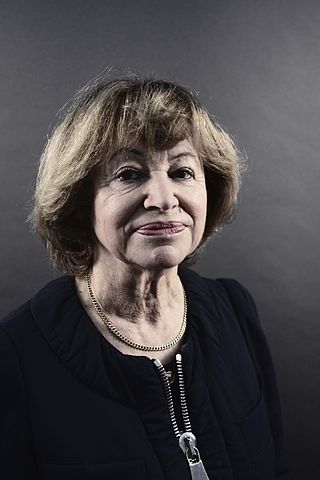
Catherine Jeanne Cesarsky is an Argentine and French astronomer, known for her research activities in astrophysics and for her leadership in astronomy and atomic energy. She is the current chairperson of the Square Kilometre Array's governing body, SKAO Council. She was the first female president of the International Astronomical Union (2006-2009) and the first female director general of the European Southern Observatory (1999-2007).
The work of the Helmholtz Centre for Environmental Research – UFZ covers both basic research and applied research.
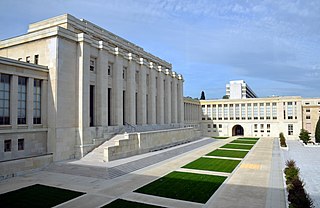
An international organization, also known as an intergovernmental organization or an international institution, is an organization that is established by a treaty or other type of instrument governed by international law and possesses its own legal personality, such as the United Nations, the World Health Organization, International Union for Conservation of Nature, and NATO. International organizations are composed of primarily member states, but may also include other entities, such as other international organizations, firms, and nongovernmental organizations. Additionally, entities may hold observer status. An alternative definition is that an international organization is a stable set of norms and rules meant to govern the behavior of states and other actors in the international system.
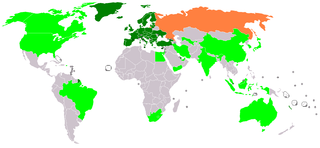
The European Telecommunications Standards Institute (ETSI) is an independent, not-for-profit, standardization organization operating in the field of information and communications. ETSI supports the development and testing of global technical standards for ICT-enabled systems, applications and services.

The Organisation for Economic Co-operation and Development is an intergovernmental organisation with 38 member countries, founded in 1961 to stimulate economic progress and world trade. It is a forum whose member countries describe themselves as committed to democracy and the market economy, providing a platform to compare policy experiences, seek answers to common problems, identify good practices, and coordinate domestic and international policies of its members.

The International Institute for Sustainable Development (IISD) is an independent think tank founded in 1990 working to shape and inform international policy on sustainable development governance. The institute has three offices in Canada - Winnipeg, Ottawa, and Toronto, and one office in Geneva, Switzerland. It has over 150 staff and associates working in over 30 countries.
ELIXIR is an initiative that allows life science laboratories across Europe to share and store their research data as part of an organised network. Its goal is to bring together Europe's research organisations and data centres to help coordinate the collection, quality control and storage of large amounts of biological data produced by life science experiments. ELIXIR aims to ensure that biological data is integrated into a federated system easily accessible by the scientific community.
A European Research Infrastructure Consortium (ERIC) is a full juridical person and a corporation under European Union law. With a membership of at least one European Union member state and two EU member or associated states, it has legal personality and full legal capacity recognized in all Member States. Currently there are 25 ERICs established.














